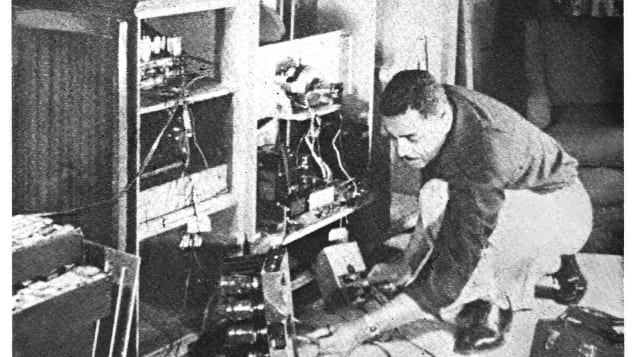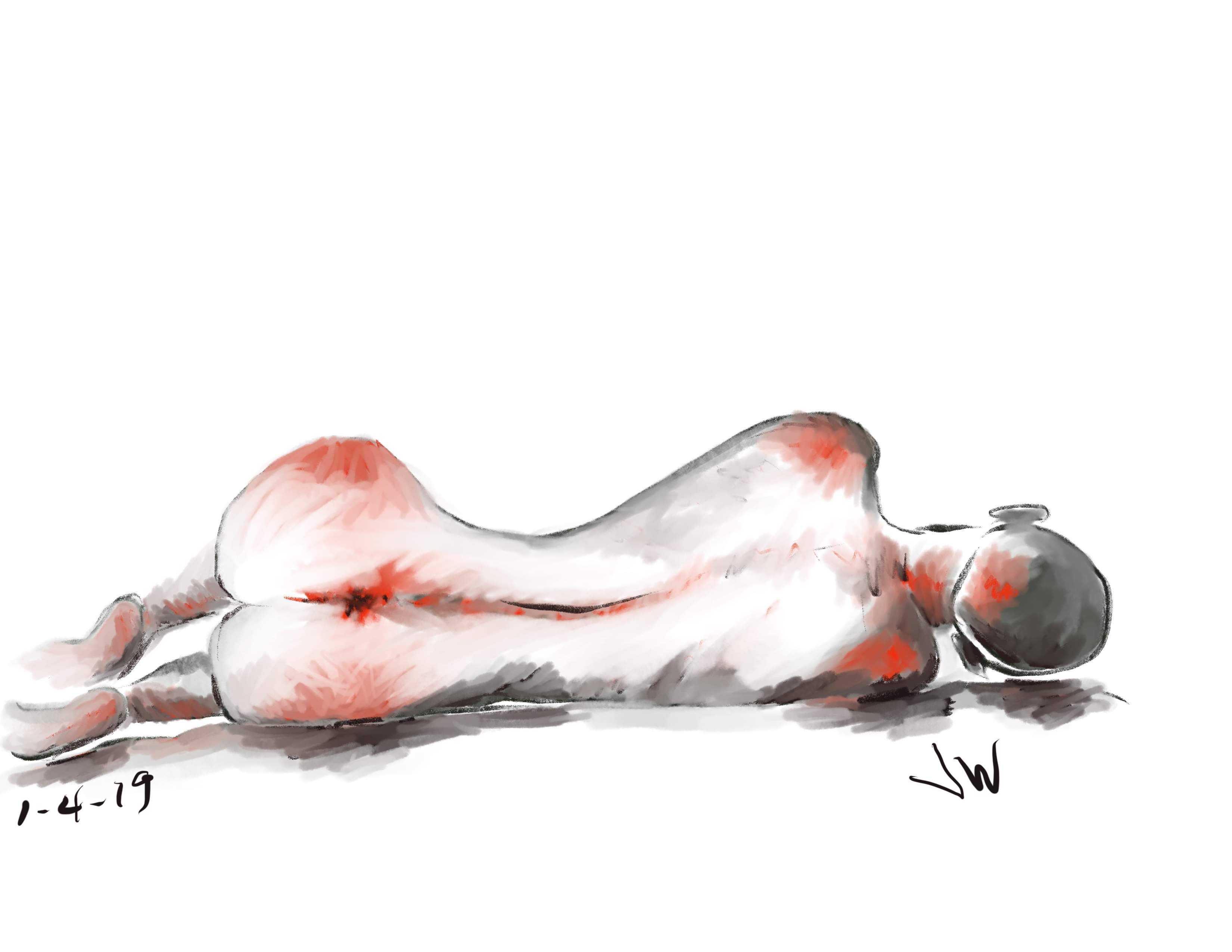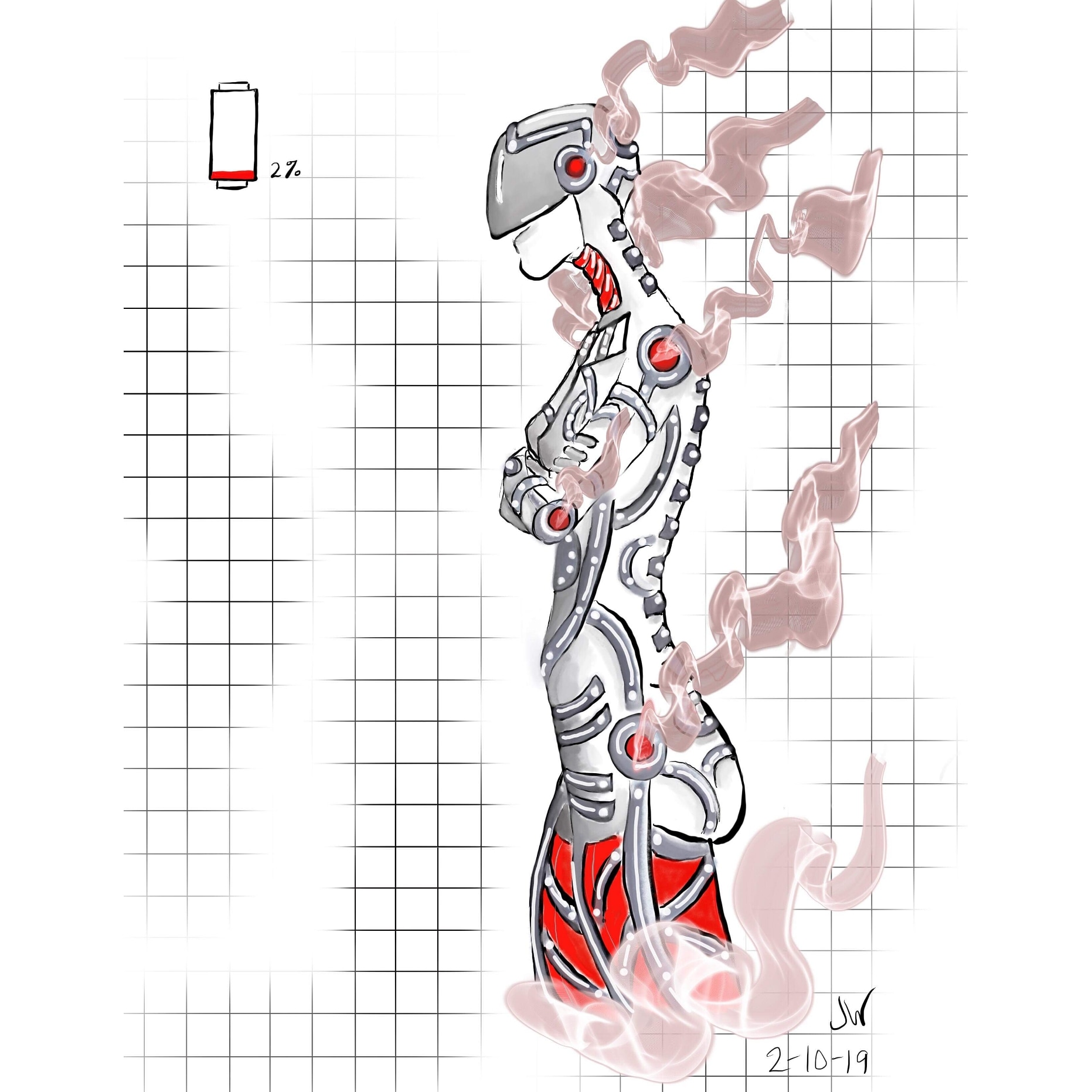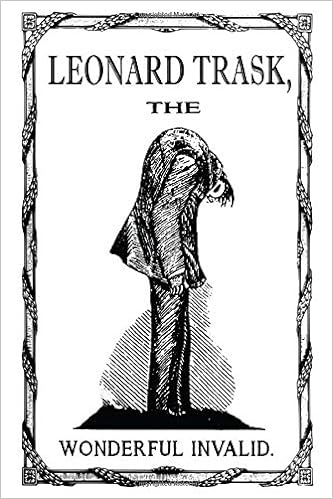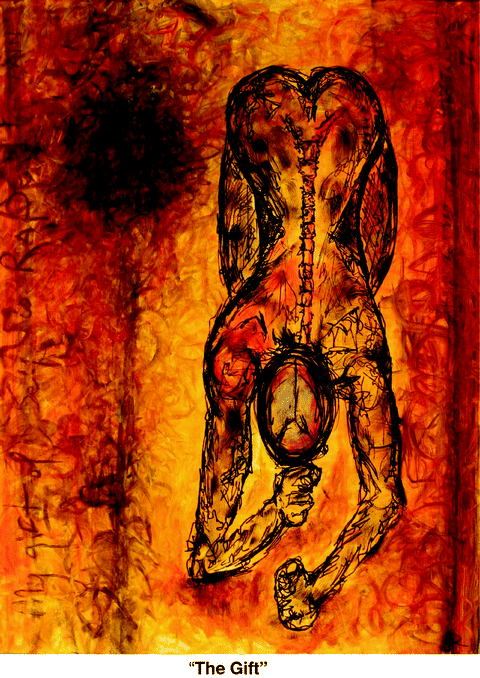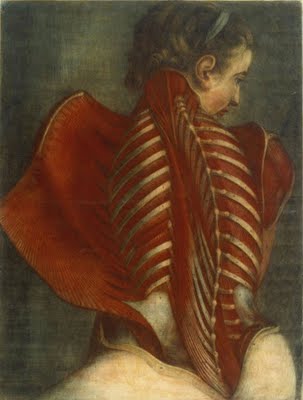You are using an out of date browser. It may not display this or other websites correctly.
You should upgrade or use an alternative browser.
You should upgrade or use an alternative browser.
Merkabah
- Thread starter Skarekrow
- Start date
More options
Who Replied?java
Community Member
- MBTI
- ????
Enough stuff with eyes! Leave people's eyes alone!
Skarekrow
~~DEVIL~~
- MBTI
- Ni-INFJ-A
- Enneagram
- Warlock
So super tempted to post a video of a lens replacement in an eye.Enough stuff with eyes! Leave people's eyes alone!
I assisted with surgery in the eye room fairly frequently.
It wasn't my favorite specialty to do, but at least you got to sit down in a chair.
Skarekrow
~~DEVIL~~
- MBTI
- Ni-INFJ-A
- Enneagram
- Warlock
Wow...a 12 minute rock ballad!
Good stuff, pretty rad...thanks!!
Hope you are well?
:<3white:
ThomasJ79
Intertwined
- MBTI
- INTJ
- Enneagram
- 5
Wow...a 12 minute rock ballad!
Good stuff, pretty rad...thanks!!
Hope you are well?
:<3white:
Besides worrying about Trump starting a worldwide fire while playing with matches a bunch of idiots gave him, I am actually doing pretty well, thank you.
How about yourself man? Have a good holiday season?
Skarekrow
~~DEVIL~~
- MBTI
- Ni-INFJ-A
- Enneagram
- Warlock
Yes...the anomaly of destruction that is Trump is definitely an evil douche.Besides worrying about Trump starting a worldwide fire while playing with matches a bunch of idiots gave him, I am actually doing pretty well, thank you.
How about yourself man? Have a good holiday season?
I will be incredibly happy when him and his cronies are no longer selling this country out.
Glad you are doing alright, it good to see you around and posting after you were gone for a while.
Talk to you more soon!
Much love!
:<3white:
ThomasJ79
Intertwined
- MBTI
- INTJ
- Enneagram
- 5
Yes...the anomaly of destruction that is Trump is definitely an evil douche.
I will be incredibly happy when him and his cronies are no longer selling this country out.
Glad you are doing alright, it good to see you around and posting after you were gone for a while.
Talk to you more soon!
Much love!
:<3white:
Same to you!
Yeah, I feel refreshed. I needed some time away for contemplation. Thank you for asking.
Peace
Skarekrow
~~DEVIL~~
- MBTI
- Ni-INFJ-A
- Enneagram
- Warlock
Early morning can't sleep too much pain post.
Enjoy!
(CNN) — The past, it has been said, is a foreign country.
And sometimes it's another country we yearn to visit.
We can't, of course.
Whereas actual travel is limited only by how much cash we can spare, visa requirements and flight cancellations, journeying to times gone by is limited by the cold, hard laws of physics.
Or maybe it's not.
Joining the ranks of movie inventors like Doc Brown of "Back to the Future" are a few real-life scientists currently trying to realize the dream of turning back the clock to travel to the ultimate destination.
Among them is Ron Mallett, an astrophysicist who has dedicated much of his adult life to the notion that time travel is possible.
He's come up with the scientific equations and principles upon which he says a time machine could be created.
While acknowledging that his theories and designs are unlikely to allow time travel in his lifetime, for years he's been working in parallel to a respected academic career to fulfill his dream of venturing back in time to see his beloved father again.
Mallett was aged 10 when his father died suddenly, of a heart attack, an event that the scientist says changed the track of his life forever.
"For me, the sun rose and set on him, he was just the center of things," he tells CNN Travel. "Even today, after all of these years, there's still an unreality about it for me."
Mallett's father, a TV repair man, instilled in his son a love of reading, and encouraged his budding passion for science.
About a year after his father's death, a grieving Mallett stumbled across an illustrated version of the classic sci-fi novel "The Time Machine."
"The book that changed my life," he says.
Thanks to the imagination of author H.G. Wells, suddenly Mallett felt his family tragedy presented not an end -- but a beginning.
Sixty years later, 74-year-old Mallett is a professor of physics at the University of Connecticut.
He's spent his career investigating black holes and general relativity -- the theories of space, time and gravity famously explored by Albert Einstein.
Mallett has also been theorizing about time travel, in the course of which he has embarked on his own personal journey: a complex and often contentious quest to build a machine capable of visiting the past.
He's still a long way from his destination -- some would argue he'll never get there -- but his voyage makes for a poignant story that dwells on the power of love, the potency of childhood dreams and the human desire to control destiny in an unknowable universe.
Mallett first encountered the concept of time travel back in the 1950s.
"We hadn't even gone into space," he recalls. "And people weren't even sure if we could."
Growing up in New York City's Bronx neighborhood, and later in Pennsylvania, Mallett's family struggled for money.
As a self-described "bookaholic" he still found ways to get hold of reading material, finding comfort, after his father's death, among the the shelves of the local Salvation Army bookstore.
It was here that Mallett encountered the writings of Einstein, his next key inspiration.
He continued poring over science books throughout his teenage years and, after leaving high school, aimed for college via the G.I. Bill which supports US military veterans in their post-service education.
He enlisted in the US Air Force, where he served for four years, including deployment to Vietnam.
Eventually, Mallett made it to academia.
He gained a bachelor's degree in physics, followed by a master's and a doctorate, specializing in Einstein's theory.
His first job was working on lasers at United Technologies, an aircraft manufacturer, looking into how they could be used to bore holes in the turbine blades of jet engines.
After a couple of years of applying mathematical theories in this practical setting, Mallet joined the University of Connecticut (UCONN) as an assistant professor of physics.
Through all of this, from Vietnam to back again, Mallett was quietly considering the possibility of time travel.
But he only began speaking publicly about his ambitions once UCONN made him a tenured professor, an open-ended academic position that grants holders the freedom to work largely free from fear of dismissal.
"I wanted to make sure that I got to that pinnacle of professionalism," he says, "Even then I was a bit reluctant."
He was aware of the "mad professor" stereotype. He wanted to ensure his ambitions weren't ridiculed and his job threatened.
But when Mallett began speaking openly about his ideas, he found they struck a chord with many others, something he says shows the universality of the desire to revisit the past.
We all have, he says, regrets, or past decisions we wonder about, or people we've lost who we long to see again.
"People started contacting me, literally from all over the world about the possibility of going back in time," he says.
Today, photos of Mallett at work show him surrounded by equipment in a cluttered laboratory, demonstrating his principles at work via small-scale experiments -- or standing, beaming, in front of chalk boards where he's etched out his formulas.
The personal aspect of Mallett's work is profoundly moving, but how plausible is the science behind his ideas?
It all hinges, says Mallett, on Einstein's special theory of relativity and general theory of relativity.
"To put it in a nutshell, Einstein said that time can be affected by speed," says Mallett.
Mallett gives the example of astronauts traversing space in a rocket that's traveling close to the speed of light.
Time would pass differently on Earth than it would for the people in the rocket.
"They could actually come back finding out that they're only a few years older, but decades have passed here on Earth," he says.
Mallett points to the 1968 sci-fi classic movie "Planet of the Apes," at the end of which [spoiler alert] an astronaut realizes that he hasn't traveled to a distant, ape-ruled planet, but merely returned to Earth in a post-apocalyptic future in which mankind has been subjugated by simians.
"That is an accurate representation of Einstein's special theory of relativity," says Mallet. "So the upshot is that, according to the special theory of relativity, if you're traveling fast enough, you respectively are traveling through time. And effectively, that would be a representation of time travel."
However, this is all about going forward not backward, so how would this help Mallett's quest to be reunited with his father?
Einstein's general theory of relativity is based in the concept of gravity -- and considers how time is affected by gravity.
"What Einstein meant by that is the stronger gravity is, the more time will slow down," says Mallett.
Einstein's general theory of relativity says that what we call the force of gravity isn't a force at all, it's actually the bending of space by a massive object.
"If you can bend space, there's a possibility of you twisting space," says Mallett.
"In Einstein's theory, what we call space also involves time -- that's why it's called space time, whatever it is you do to space also happens to time."
Mallett posits that by twisting time into a loop, one could travel from the future back to the past -- and then back to the future.
And this is the idea of a wormhole, a sort of tunnel with two openings.
Mallett suggests that light could also be used to affect time via something called a ring laser.

In "Back to the Future," inventor Doc Brown succeeds in building a time travel machine.
He's created a prototype illustrating how lasers could be used to create a circulating beam of light that twists space and time -- inspired by his first job experimenting with lasers' effect on airplane jet engines.
"It turned out my understanding about lasers eventually helped me in my breakthrough with understanding how I might be able to find a whole new way for the basis of a time machine," says Mallett.
"By studying the type of gravitational field that was produced by a ring laser, this could lead to a new way of looking at the possibility of a time machine based on a circulating beam of light."
Mallett's also got a theoretical equation that, he argues, proves this would work.
"Eventually a circulating beam of laser lights could act as a sort of a time machine and cause a twisting of time that would allow you to go back into the past," he says.
There's a snag though -- a pretty big one.
"You can send information back, but you can only send it back to the point at which you turn the machine on," says Mallett.
While his quest to go back to the 1950s isn't anywhere closer to a reality, he remains optimistic, and continues to ponder possibilities.
So could there be a not-too-distant future in which time travel is part of our daily reality?
After all, we're entering a new decade in which once fanciful concepts like space tourism and hyperloop trains are entering the realms of possibility.
Maybe, but not everyone thinks so.
"Time travel into the past is allowed, potentially, in our theory of general relativity, how we understand gravity," says Paul Sutter, an astrophysicist who hosts a podcast called "Ask a Spaceman!"
"But every time we try to concoct a theoretical time travel device, some other bit of physics busts in and breaks up the party."
Sutter says he is aware of Mallett's work, and thinks it's interesting, if not necessarily on track to deliver results.
"I don't think it's necessarily going to be fruitful, because I do think that there are deep flaws in his mathematics and his theory, and so a practical device seems unattainable."
Serious criticism of Mallett's theory was voiced in 2005 by Ken D. Olum and Allen Everett, of the Institute of Cosmology, Department of Physics and Astronomy at Tufts University.
They said they'd found holes in Mallett's equation and the practicality of his proposed device.
British science writer Brian Clegg looks more favorably on Mallett's ideas, he also profiled the scientist in his book, "How to Build a Time Machine."
"While not everyone agrees that his planned device would work, I think it's an interesting enough proposition to go for an experimental trial," says Clegg.
"If it did work, it should be stressed that it's not a practical time machine, it would simply produce a tiny but measurable effect, which would demonstrate the principle."
Mallett is quick to clarify that his ideas are theoretical.
He says he's currently trying to get funds to conduct real-life experiments.
"It's not like the movies," says Mallett. "It's not going happen at the end of two hours, at the cost of whatever it is you pay for the movie ticket. It's going to cost."
Movie comparisons are a common theme of conversation with Mallett.
He relishes explaining concepts about time travel through cinematic examples.
When asked about the ethical implications of going back to the past, he suggests there'd be a need for international regulation and policing, and namechecks 1994 movie "Timecop," in which Jean-Claude Van Damme plays an officer working for an agency regulating time travel.
Another favorite, says Mallett, is the 2014 Christopher Nolan movie "Interstellar," which deals in ideas of how time impacts people in space differently than people on Earth.
That movie's scientific credentials were boosted by the involvement of Nobel prize-winning theoretical physicist Kip Thorne.
But Mallet also appreciates the emotional core of the movie -- the father-daughter story that drives the plot: "It's beautiful," he says.
Hollywood has come calling for Mallett a few times.
A proposed adaptation of "The Time Traveler," an autobiography he co-authored in 2008, fell through despite the involvement of celebrated director Spike Lee.
Mallett says a major production company has now bought the rights to his story and there's another cinematic project in the works.
Even after a lifetime spent investigating time travel, Mallet may never physically go back to 1950s New York.
But, thanks to the magic of cinema, he may yet get a glimpse of the past, that "foreign country", and, in a way, meet his father one last time.
"The idea I will actually be able to see my father on the big screen, it will almost be like bringing him back to life for me," says Mallett, poignantly.
Enjoy!
Meet the scientist trying to travel back in time
Francesca Street

Francesca Street
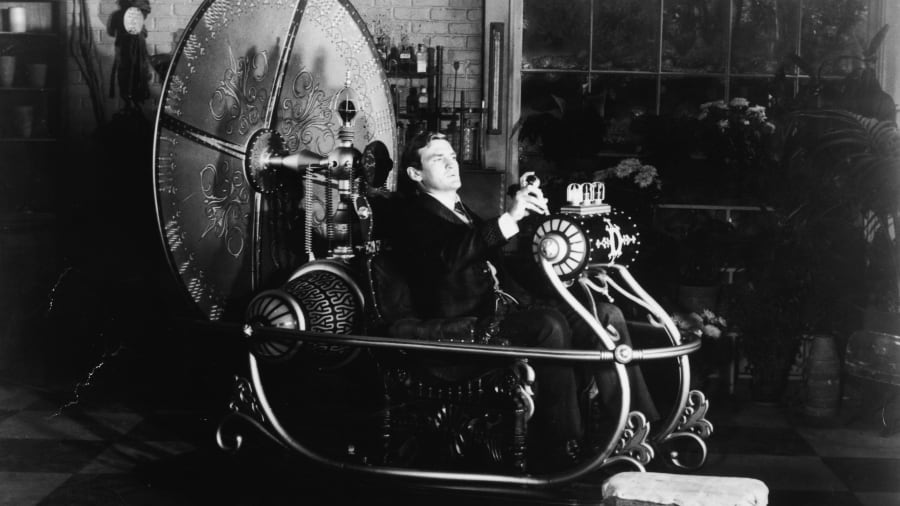
(CNN) — The past, it has been said, is a foreign country.
And sometimes it's another country we yearn to visit.
We can't, of course.
Whereas actual travel is limited only by how much cash we can spare, visa requirements and flight cancellations, journeying to times gone by is limited by the cold, hard laws of physics.
Or maybe it's not.
Joining the ranks of movie inventors like Doc Brown of "Back to the Future" are a few real-life scientists currently trying to realize the dream of turning back the clock to travel to the ultimate destination.
Among them is Ron Mallett, an astrophysicist who has dedicated much of his adult life to the notion that time travel is possible.
He's come up with the scientific equations and principles upon which he says a time machine could be created.
While acknowledging that his theories and designs are unlikely to allow time travel in his lifetime, for years he's been working in parallel to a respected academic career to fulfill his dream of venturing back in time to see his beloved father again.
Mallett was aged 10 when his father died suddenly, of a heart attack, an event that the scientist says changed the track of his life forever.
"For me, the sun rose and set on him, he was just the center of things," he tells CNN Travel. "Even today, after all of these years, there's still an unreality about it for me."
Mallett's father, a TV repair man, instilled in his son a love of reading, and encouraged his budding passion for science.
About a year after his father's death, a grieving Mallett stumbled across an illustrated version of the classic sci-fi novel "The Time Machine."
"The book that changed my life," he says.
Thanks to the imagination of author H.G. Wells, suddenly Mallett felt his family tragedy presented not an end -- but a beginning.
Sixty years later, 74-year-old Mallett is a professor of physics at the University of Connecticut.
He's spent his career investigating black holes and general relativity -- the theories of space, time and gravity famously explored by Albert Einstein.
Mallett has also been theorizing about time travel, in the course of which he has embarked on his own personal journey: a complex and often contentious quest to build a machine capable of visiting the past.
He's still a long way from his destination -- some would argue he'll never get there -- but his voyage makes for a poignant story that dwells on the power of love, the potency of childhood dreams and the human desire to control destiny in an unknowable universe.
Mallett first encountered the concept of time travel back in the 1950s.
"We hadn't even gone into space," he recalls. "And people weren't even sure if we could."
Growing up in New York City's Bronx neighborhood, and later in Pennsylvania, Mallett's family struggled for money.
As a self-described "bookaholic" he still found ways to get hold of reading material, finding comfort, after his father's death, among the the shelves of the local Salvation Army bookstore.
It was here that Mallett encountered the writings of Einstein, his next key inspiration.
He continued poring over science books throughout his teenage years and, after leaving high school, aimed for college via the G.I. Bill which supports US military veterans in their post-service education.
He enlisted in the US Air Force, where he served for four years, including deployment to Vietnam.
Eventually, Mallett made it to academia.
He gained a bachelor's degree in physics, followed by a master's and a doctorate, specializing in Einstein's theory.
His first job was working on lasers at United Technologies, an aircraft manufacturer, looking into how they could be used to bore holes in the turbine blades of jet engines.
After a couple of years of applying mathematical theories in this practical setting, Mallet joined the University of Connecticut (UCONN) as an assistant professor of physics.
Through all of this, from Vietnam to back again, Mallett was quietly considering the possibility of time travel.
But he only began speaking publicly about his ambitions once UCONN made him a tenured professor, an open-ended academic position that grants holders the freedom to work largely free from fear of dismissal.
"I wanted to make sure that I got to that pinnacle of professionalism," he says, "Even then I was a bit reluctant."
He was aware of the "mad professor" stereotype. He wanted to ensure his ambitions weren't ridiculed and his job threatened.
But when Mallett began speaking openly about his ideas, he found they struck a chord with many others, something he says shows the universality of the desire to revisit the past.
We all have, he says, regrets, or past decisions we wonder about, or people we've lost who we long to see again.
"People started contacting me, literally from all over the world about the possibility of going back in time," he says.
The science behind it all

Mallett with his key equation, which he says proves time travel is possible.

Mallett with his key equation, which he says proves time travel is possible.
Today, photos of Mallett at work show him surrounded by equipment in a cluttered laboratory, demonstrating his principles at work via small-scale experiments -- or standing, beaming, in front of chalk boards where he's etched out his formulas.
The personal aspect of Mallett's work is profoundly moving, but how plausible is the science behind his ideas?
It all hinges, says Mallett, on Einstein's special theory of relativity and general theory of relativity.
"To put it in a nutshell, Einstein said that time can be affected by speed," says Mallett.
Mallett gives the example of astronauts traversing space in a rocket that's traveling close to the speed of light.
Time would pass differently on Earth than it would for the people in the rocket.
"They could actually come back finding out that they're only a few years older, but decades have passed here on Earth," he says.
Mallett points to the 1968 sci-fi classic movie "Planet of the Apes," at the end of which [spoiler alert] an astronaut realizes that he hasn't traveled to a distant, ape-ruled planet, but merely returned to Earth in a post-apocalyptic future in which mankind has been subjugated by simians.
"That is an accurate representation of Einstein's special theory of relativity," says Mallet. "So the upshot is that, according to the special theory of relativity, if you're traveling fast enough, you respectively are traveling through time. And effectively, that would be a representation of time travel."
However, this is all about going forward not backward, so how would this help Mallett's quest to be reunited with his father?
Einstein's general theory of relativity is based in the concept of gravity -- and considers how time is affected by gravity.
"What Einstein meant by that is the stronger gravity is, the more time will slow down," says Mallett.
Einstein's general theory of relativity says that what we call the force of gravity isn't a force at all, it's actually the bending of space by a massive object.
"If you can bend space, there's a possibility of you twisting space," says Mallett.
"In Einstein's theory, what we call space also involves time -- that's why it's called space time, whatever it is you do to space also happens to time."
Mallett posits that by twisting time into a loop, one could travel from the future back to the past -- and then back to the future.
And this is the idea of a wormhole, a sort of tunnel with two openings.
Mallett suggests that light could also be used to affect time via something called a ring laser.
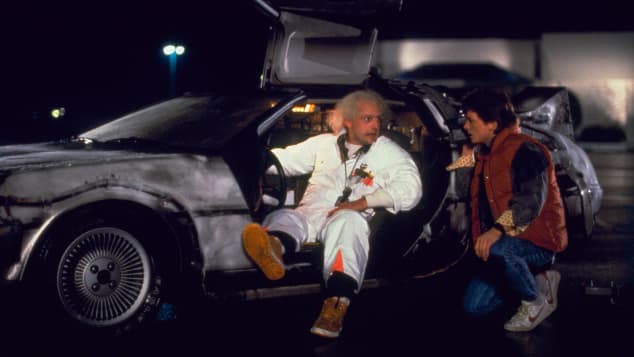
In "Back to the Future," inventor Doc Brown succeeds in building a time travel machine.
He's created a prototype illustrating how lasers could be used to create a circulating beam of light that twists space and time -- inspired by his first job experimenting with lasers' effect on airplane jet engines.
"It turned out my understanding about lasers eventually helped me in my breakthrough with understanding how I might be able to find a whole new way for the basis of a time machine," says Mallett.
"By studying the type of gravitational field that was produced by a ring laser, this could lead to a new way of looking at the possibility of a time machine based on a circulating beam of light."
Mallett's also got a theoretical equation that, he argues, proves this would work.
"Eventually a circulating beam of laser lights could act as a sort of a time machine and cause a twisting of time that would allow you to go back into the past," he says.
There's a snag though -- a pretty big one.
"You can send information back, but you can only send it back to the point at which you turn the machine on," says Mallett.
While his quest to go back to the 1950s isn't anywhere closer to a reality, he remains optimistic, and continues to ponder possibilities.
So could there be a not-too-distant future in which time travel is part of our daily reality?
After all, we're entering a new decade in which once fanciful concepts like space tourism and hyperloop trains are entering the realms of possibility.
Maybe, but not everyone thinks so.
"Time travel into the past is allowed, potentially, in our theory of general relativity, how we understand gravity," says Paul Sutter, an astrophysicist who hosts a podcast called "Ask a Spaceman!"
"But every time we try to concoct a theoretical time travel device, some other bit of physics busts in and breaks up the party."
Sutter says he is aware of Mallett's work, and thinks it's interesting, if not necessarily on track to deliver results.
"I don't think it's necessarily going to be fruitful, because I do think that there are deep flaws in his mathematics and his theory, and so a practical device seems unattainable."
Serious criticism of Mallett's theory was voiced in 2005 by Ken D. Olum and Allen Everett, of the Institute of Cosmology, Department of Physics and Astronomy at Tufts University.
They said they'd found holes in Mallett's equation and the practicality of his proposed device.
British science writer Brian Clegg looks more favorably on Mallett's ideas, he also profiled the scientist in his book, "How to Build a Time Machine."
"While not everyone agrees that his planned device would work, I think it's an interesting enough proposition to go for an experimental trial," says Clegg.
"If it did work, it should be stressed that it's not a practical time machine, it would simply produce a tiny but measurable effect, which would demonstrate the principle."
Mallett is quick to clarify that his ideas are theoretical.
He says he's currently trying to get funds to conduct real-life experiments.
"It's not like the movies," says Mallett. "It's not going happen at the end of two hours, at the cost of whatever it is you pay for the movie ticket. It's going to cost."
Movie comparisons are a common theme of conversation with Mallett.
He relishes explaining concepts about time travel through cinematic examples.
When asked about the ethical implications of going back to the past, he suggests there'd be a need for international regulation and policing, and namechecks 1994 movie "Timecop," in which Jean-Claude Van Damme plays an officer working for an agency regulating time travel.
Another favorite, says Mallett, is the 2014 Christopher Nolan movie "Interstellar," which deals in ideas of how time impacts people in space differently than people on Earth.
That movie's scientific credentials were boosted by the involvement of Nobel prize-winning theoretical physicist Kip Thorne.
But Mallet also appreciates the emotional core of the movie -- the father-daughter story that drives the plot: "It's beautiful," he says.
Hollywood has come calling for Mallett a few times.
A proposed adaptation of "The Time Traveler," an autobiography he co-authored in 2008, fell through despite the involvement of celebrated director Spike Lee.
Mallett says a major production company has now bought the rights to his story and there's another cinematic project in the works.
Even after a lifetime spent investigating time travel, Mallet may never physically go back to 1950s New York.
But, thanks to the magic of cinema, he may yet get a glimpse of the past, that "foreign country", and, in a way, meet his father one last time.
"The idea I will actually be able to see my father on the big screen, it will almost be like bringing him back to life for me," says Mallett, poignantly.
This is very true. With Dad recently being diagnosed with Parkinson's, the neurologist perscribed Carbidopa / Levodopa 4x's a day.For example, too little dopamine can result in disorders like Parkinson’s Disease, involving symptoms of muscle rigidity, tremors and changes in speech and gait.
One of the treatments for Parkinson’s is the drug L-DOPA, which can cross the blood-brain barrier and be converted into dopamine to help ease the symptoms.
(Also for the few who can not take the above they've made a synthetic. https://www.rxlist.com/sinemet-drug.htm#description)
He's been taking it for almost a month and the improvements are astounding, but so are the noticable setbacks when he is an hour or two behind his scheduled dose. The purpose we were told was to keep the "freezing" episodes to a minimum but also to help slow down the motor decline. Unfortuneately, the non-motir symptoms have increased. For example hallucinations, today he said the crab apple tree had disappeared from the side lawn. We went to the window and there was the tree. From his vantage point in the kitchen he did not see it though I could see it fine. Another example is the confusion of why the TV reflects in the china cabinet glass though they sit almost side by side. I wiggled a picture frame on the wall above where he was sitting and showed him that the TV was reflected in the glass of the frame and then with trick of lighting was projected onto the glass of the china cabinet. Simple science to us but an amazing event to him.
The medicine has him acting 'stoned' much of the time, observing things like one would with psychedelics or marjuana. I chuckle at some of the senarios he asks me to explain. He never used any street drugs so these thoughts and experiences are unfamiliar to him. I do my best to explain them away for him, but sometimes, when it's getting close to his dosage time, and he's 'coming down' the experience causes him stress.
So, given the important role of dopamine in vital functions in the human brain, why would we want to fast from it?
However, that this would “reset the brain” is not really correct – there is no way of even knowing what the baseline is.
So from a neuroscience perspective, this is nonsense for the time being.
So imho, I'd have to disagree that anyone try this type of 'fasting'. It would seem to me that dopamine suppression over time would actually give a person Parkinson's syndrome. ???In these instances, you may want to think about removing the cues that stimulate your dopamine neurons – a sort of dopamine fasting.
It's a terrible disease, really, and can creep into a person as early as 15 years old, though most get it after aged 60.
If you have time...
Speaking of Depression, I'm not sure if I shared this link in my blog it's not just for hereditary cancer genes
https://myriad.com/patients-families/patient-resources/
They are a company that does genetic testing for other things too. Under the Product & Services tab there is another tab for Depression. It seems there can be a hereditary link amongst family members with depression.
I'm always on the look out for things related to depression because far too many people I know are affected in one way or another by it.
Skarekrow
~~DEVIL~~
- MBTI
- Ni-INFJ-A
- Enneagram
- Warlock
This is very true. With Dad recently being diagnosed with Parkinson's, the neurologist perscribed Carbidopa / Levodopa 4x's a day.
(Also for the few who can not take the above they've made a synthetic. https://www.rxlist.com/sinemet-drug.htm#description)
He's been taking it for almost a month and the improvements are astounding, but so are the noticable setbacks when he is an hour or two behind his scheduled dose. The purpose we were told was to keep the "freezing" episodes to a minimum but also to help slow down the motor decline. Unfortuneately, the non-motir symptoms have increased. For example hallucinations, today he said the crab apple tree had disappeared from the side lawn. We went to the window and there was the tree. From his vantage point in the kitchen he did not see it though I could see it fine. Another example is the confusion of why the TV reflects in the china cabinet glass though they sit almost side by side. I wiggled a picture frame on the wall above where he was sitting and showed him that the TV was reflected in the glass of the frame and then with trick of lighting was projected onto the glass of the china cabinet. Simple science to us but an amazing event to him.
The medicine has him acting 'stoned' much of the time, observing things like one would with psychedelics or marjuana. I chuckle at some of the senarios he asks me to explain. He never used any street drugs so these thoughts and experiences are unfamiliar to him. I do my best to explain them away for him, but sometimes, when it's getting close to his dosage time, and he's 'coming down' the experience causes him stress.
So imho, I'd have to disagree that anyone try this type of 'fasting'. It would seem to me that dopamine suppression over time would actually give a person Parkinson's syndrome. ???
It's a terrible disease, really, and can creep into a person as early as 15 years old, though most get it after aged 60.
If you have time...
Speaking of Depression, I'm not sure if I shared this link in my blog it's not just for hereditary cancer genes
https://myriad.com/patients-families/patient-resources/
They are a company that does genetic testing for other things too. Under the Product & Services tab there is another tab for Depression. It seems there can be a hereditary link amongst family members with depression.
I'm always on the look out for things related to depression because far too many people I know are affected in one way or another by it.
I'm glad that the medication is able to help somewhat...I have a short article on naturally increasing your dopamine I will post at the end here.
Yes, they are exploring the link between low dopamine and Parkinson's...the issue is the cells that produce dopamine dying more than there being low dopamine to start...symptoms begin once enough dopamine producing cells die to cause motor skill dysfunction and other symptoms.
There are some other neurotransmitters that could play a factor, like norepinephrine...it's sad that they really don't know the true cause of the disease.
They say it's a combination of genetic and environmental factors, and even things like high stress play a role.
Of course...if you are under high stress all the time chances are your dopamine is already low from whatever constant stressor.
I find some of the "biohacking" coming from the SF Bay area and the techies to be downright idiotic and some incredibly dangerous.
This one probably wouldn't hurt a normal person if done for a short amount of time...I understand the concept...it's the same idea of getting used to any kind of "high" be it synthetically chemical or natural - why some folks are considered "adrenaline junkies".
That to abstain from something for a period of time can increase the intensity and efficacy of such things as a result of the time spent in abstinence - as opposed to a constant dose of something...why dosages and amounts of drugs are often increased over time.
But I have to concur with you...and I think for the most part the article does as well.
I find some of the stuff they are doing to themselves like injecting genes they've edited back into themselves to be entirely unscientific and akin to a child with a chemistry set mixing random things together until something starts to bubble and then claiming they've figured something out.
Splicing animal genes into yourself isn't going to turn you into Spiderman, it's going to screw up your immune system or worse.
So yeah...I don't think that a supposed "dopamine fast" for a few days would hurt anyone....a normal persons' brain would still produce enough dopamine to remain functional - though perhaps if repeated over and over again it may predispose or put someone at a higher risk for Parkinson's.
It could probably be the natural forced "fasting" that conditions of stress and life these days create that perhaps builds up to the eruption of the disease?
IDK.
I do know that he knows you love him and I know you take wonderful care of him.
I hope you are also taking care of yourself...sending you all my love!
Much love!
:<3white:
Dopamine is a key neurotransmitter for motivation, focus and productivity. Learn the symptoms of dopamine deficiency and natural ways to increase dopamine levels …
There are about 100 billion neurons in the human brain — about as many stars as there are in the Milky Way. These cells communicate with each other via brain chemicals called neurotransmitters.
Dopamine is the neurotransmitter responsible for providing motivation, drive, and focus. It plays a role in many mental disorders including depression, addictions, ADHD, and schizophrenia.
Let’s take a closer look at dopamine — what it does, symptoms of deficiency, and how to increase it naturally.
Dopamine: The Motivation Molecule
Dopamine has been called our “motivation molecule.” It boosts our drive, focus, and concentration. It enables us to plan ahead and resist impulses so we can achieve our goals. It gives us that “I did it!” lift when we accomplish what we set out to do. It makes us competitive and provides the thrill of the chase in all aspects of life — business, sports, and love.
Dopamine is in charge of our pleasure-reward system. (1) It allows us to have feelings of enjoyment, bliss, and even euphoria. But too little dopamine can leave you unfocused, unmotivated, lethargic, and even depressed.
Dopamine Deficiency Symptoms
People low in dopamine lack a zest for life. They exhibit low energy and motivation, and often rely on caffeine, sugar, or other stimulants to get through the day.
Many common dopamine deficiency symptoms are similar to those of depression:
How to Increase Dopamine Naturally
There are plenty of unhealthy ways to raise dopamine. But you don’t have to resort to “sex, drugs, and rock ‘n’ roll” to boost your dopamine levels. Here are some healthy, proven ways to increase dopamine levels naturally.
Foods That Increase Dopamine
Dopamine is made from the amino acid tyrosine. Eating a diet high in tyrosine will ensure you’ve got the basic building blocks needed for dopamine production.
Here’s a list of tyrosine-rich foods: (3, 4, 5, 6)
An overabundance of bad bacteria leaves toxic byproducts called lipopolysaccharides which lower levels of dopamine. (7)
Sugar has been found to boost dopamine but this is a temporary boost, more drug-like than food-like. (8)
Dopamine Supplements
There are supplements that can raise dopamine levels naturally.
Curcumin is the active ingredient in the spice turmeric. It’s available in an isolated form as a supplement. It readily crosses the blood-brain barrier and can boost levels of dopamine. (9, 10, 11)
Curcumin has been found to help alleviate obsessive actions and improve associated memory loss by increasing dopamine. (12, 13)
Ginkgo biloba is traditionally used for a variety of brain-related problems — poor concentration, forgetfulness, headaches, fatigue, mental confusion, depression, and anxiety. (14)
One of the mechanisms by which ginkgo works is by raising dopamine. (15, 16)
L-theanine is a component found in green tea. It increases levels of dopamine along with other neurotransmitters serotonin and GABA. (17, 18) L-theanine improves recall, learning, and positive mood. (19, 20) You can get your dopamine boost by either taking theanine supplements or by drinking 3 cups of green tea per day. (21)
L-tyrosine — the precursor to dopamine — is available as a supplement.
We recommend taking acetyl-l-tyrosine — a more absorbable form that readily crosses the blood-brain barrier. (22)
Phosphatidylserine acts as your brain’s “gatekeeper,” regulating nutrients and waste in and out of your brain. It can increase dopamine levels and improve memory, concentration, learning, and ADHD. (23, 24, 25)
Boost Dopamine with Exercise
Physical exercise is one of the best things you can do for your brain. It boosts production of new brain cells, slows down brain cell aging, and improves the flow of nutrients to the brain. It can also increase your levels of dopamine and the other “feel good” neurotransmitters serotonin and norepinephrine. (26)
Dr. John Ratey, renowned psychiatrist and author of Spark: The Revolutionary New Science of Exercise and the Brain, has extensively studied the effects of physical exercise on the brain. He found that exercise raises baseline levels of dopamine by promoting the growth of new brain cell receptors.
Dopamine is responsible in part for the high serious runners experience. (27) But you don’t need to exercise strenuously to enhance your brain. Taking walks, or doing gentle, no-impact exercises like yoga, tai chi, or qi gong all provide powerful mind-body benefits. (28, 29, 30)
Increase Dopamine with Meditation
The benefits of meditation have been proven in over 1,000 studies. (31) Regular meditators experience enhanced ability to learn, increased creativity, and deep relaxation. It’s been shown that meditation increases dopamine, improving focus and concentration. (32)
Crafting hobbies of all kinds — knitting, quilting, sewing, drawing, photography, woodworking, and home repair — focus the brain similarly to meditation. These activities increase dopamine, ward off depression, and protect against brain aging. (33)
Listening to music can cause of release of dopamine. Oddly, you don’t even have to hear music to get this neurotransmitter flowing — just the anticipation of listening can do that. (34)
Using Your Brain’s Reward System to Balance Dopamine
Dopamine functions as a survival mechanism by releasing energy when a great opportunity is in front of you. Dopamine rewards us when our needs are met. We love dopamine surges because of the way they make us feel. But according to Dr. Loretta Graziano Breuning, author of Meet Your Happy Chemicals: Dopamine, Endorphin, Oxytocin, Serotonin, we are not designed to experience a non-stop dopamine buzz. The constant hunt for dopamine boosts can turn you into a “Wolf on Wall Street” — driven by addictions, greed, and lust.
Here are some healthy ways to balance your dopamine by working with your brain’s built-in reward system.
Enjoy the Quest
Our ancestors were on a constant quest to survive. They got a dopamine surge every time they spotted a new patch of berries or a better fishing hole because this meant they’d live to seek another day. While you can still pick berries and fish, there are endless other healthy ways you can enjoy the quest in modern life.
You can forage for new music to download, specialty ingredients to cook with, a travel package bargain, a hard-to-find collector’s item, or that perfect gift for a loved one. You can engage in specifically quest-oriented hobbies like geocaching, bird watching, rockhounding, amateur archaeology, and collecting of all kinds.
The act of seeking and finding activates your reward circuits — with no regrets later.
Create Both Long and Short Term Goals
Dopamine is released when we achieve a goal. Having only long term goals gets frustrating, so set both short term and long term goals. Short term goals don’t have to be anything major. They can be as simple as trying a new recipe, getting caught up on emails, cleaning a closet, or finally learning how to use a new app for your phone.
Break up long term goals into small short term goals to give yourself dopamine boosts along the way.
Take on a New Challenge
Getting a promotion is a great dopamine boost, but this doesn’t happen very often! But you can create your own dopamine rewards by setting a goal, then take small steps toward it every day. This can be starting a new exercise program, learning French, or challenging yourself to drive home from work a different way every day, preferably without the use of your GPS.
According to Dr. Graziano Breuning, working on a goal without fail for 45 days will train your brain to stimulate dopamine production in a new way.
Dopamine and Mental Conditions
Dopamine plays such an important role in how we live our lives, it’s no surprise that when the dopamine system is out of balance it can contribute to many mental conditions. (35)
Here are three of the most common conditions that have a dopamine connection.
Dopamine and ADHD
The underlying cause of ADHD is still unknown. Until recently it was widely accepted that the root cause of ADHD was probably an abnormality in dopamine function. This seems logical since dopamine is critical for maintaining focus. Most ADHD medications are based on this “dopamine deficiency” theory. Prescription medications used to treat ADHD are believed to work by increasing the release of dopamine and norepinephrine while slowing down their rate of reabsorption. (36)
However, the latest research suggests that the main cause of ADHD lies in a structural difference in the grey matter in the brain and not dopamine. (37)
Dopamine and Depression
Serotonin is the brain chemical most associated with depression. Selective serotonin reuptake inhibitors (SSRIs) such as Paxil, Prozac, Zoloft, Celexa, and Lexapro are prescribed for depression and work by increasing brain levels of serotonin. But this only works in about 40% of patients who use them. (38)
What about the other 60%?
There’s a growing body of evidence that shows low dopamine and not low serotonin is the cause of depression for many. Bupropion (brand name Wellbutrin) has proven effective for patients who haven’t been helped by SSRIs by addressing dopamine deficiency. (39)
How to determine if your depression is more likely from serotonin versus dopamine deficiency? Serotonin-based depression is accompanied by anxiety and irritability, while dopamine-based depression expresses itself as lethargy and lack of enjoyment of life. (40)
Dopamine and Schizophrenia
The cause of schizophrenia is unknown, but genetics and environmental factors are believed to play a role. (41) One prevailing theory is that it’s caused by an over-active dopamine system. (42, 43) Supporting evidence for this theory is that the best drugs to treat schizophrenia symptoms resemble dopamine and block dopamine receptors. (44)
However, these medications can take days to work which is indicative that the exact mechanism is not yet understood. (45)
How to Increase Dopamine in a Nutshell
Dopamine is our “motivation molecule.” It’s also in charge of our pleasure-reward system. There are both healthy ways and unhealthy ways to increase dopamine. Unhealthy ways to increase dopamine can be gateways to self-destruction and addictions. Healthy ways include eating the right foods, taking dopamine boosting supplements, physical exercise, and meditation.
Learn how to harness your reward system for a healthy stream of dopamine. Enjoy the quest, set both long term and short term goals, and take on new challenges. You’ll feel more alive, focused, productive, and motivated.
There are about 100 billion neurons in the human brain — about as many stars as there are in the Milky Way. These cells communicate with each other via brain chemicals called neurotransmitters.
Dopamine is the neurotransmitter responsible for providing motivation, drive, and focus. It plays a role in many mental disorders including depression, addictions, ADHD, and schizophrenia.
Let’s take a closer look at dopamine — what it does, symptoms of deficiency, and how to increase it naturally.
Dopamine: The Motivation Molecule
Dopamine has been called our “motivation molecule.” It boosts our drive, focus, and concentration. It enables us to plan ahead and resist impulses so we can achieve our goals. It gives us that “I did it!” lift when we accomplish what we set out to do. It makes us competitive and provides the thrill of the chase in all aspects of life — business, sports, and love.
Dopamine is in charge of our pleasure-reward system. (1) It allows us to have feelings of enjoyment, bliss, and even euphoria. But too little dopamine can leave you unfocused, unmotivated, lethargic, and even depressed.
Dopamine Deficiency Symptoms
People low in dopamine lack a zest for life. They exhibit low energy and motivation, and often rely on caffeine, sugar, or other stimulants to get through the day.
Many common dopamine deficiency symptoms are similar to those of depression:
- lack of motivation
- fatigue
- apathy
- procrastination
- inability to feel pleasure
- low libido
- sleep problems
- mood swings
- hopelessness
- memory loss
- inability to concentrate
How to Increase Dopamine Naturally
There are plenty of unhealthy ways to raise dopamine. But you don’t have to resort to “sex, drugs, and rock ‘n’ roll” to boost your dopamine levels. Here are some healthy, proven ways to increase dopamine levels naturally.
Foods That Increase Dopamine
Dopamine is made from the amino acid tyrosine. Eating a diet high in tyrosine will ensure you’ve got the basic building blocks needed for dopamine production.
Here’s a list of tyrosine-rich foods: (3, 4, 5, 6)
- all animal products
- almonds
- apples
- avocado
- bananas
- beets
- chocolate
- coffee
- fava beans
- green leafy vegetables
- green tea
- lima beans
- oatmeal
- sea vegetables
- sesame and pumpkin seeds
- turmeric
- watermelon
- wheat germ
An overabundance of bad bacteria leaves toxic byproducts called lipopolysaccharides which lower levels of dopamine. (7)
Sugar has been found to boost dopamine but this is a temporary boost, more drug-like than food-like. (8)
Dopamine Supplements
There are supplements that can raise dopamine levels naturally.
Curcumin is the active ingredient in the spice turmeric. It’s available in an isolated form as a supplement. It readily crosses the blood-brain barrier and can boost levels of dopamine. (9, 10, 11)
Curcumin has been found to help alleviate obsessive actions and improve associated memory loss by increasing dopamine. (12, 13)
Ginkgo biloba is traditionally used for a variety of brain-related problems — poor concentration, forgetfulness, headaches, fatigue, mental confusion, depression, and anxiety. (14)
One of the mechanisms by which ginkgo works is by raising dopamine. (15, 16)
L-theanine is a component found in green tea. It increases levels of dopamine along with other neurotransmitters serotonin and GABA. (17, 18) L-theanine improves recall, learning, and positive mood. (19, 20) You can get your dopamine boost by either taking theanine supplements or by drinking 3 cups of green tea per day. (21)
L-tyrosine — the precursor to dopamine — is available as a supplement.
We recommend taking acetyl-l-tyrosine — a more absorbable form that readily crosses the blood-brain barrier. (22)
Phosphatidylserine acts as your brain’s “gatekeeper,” regulating nutrients and waste in and out of your brain. It can increase dopamine levels and improve memory, concentration, learning, and ADHD. (23, 24, 25)
Boost Dopamine with Exercise
Physical exercise is one of the best things you can do for your brain. It boosts production of new brain cells, slows down brain cell aging, and improves the flow of nutrients to the brain. It can also increase your levels of dopamine and the other “feel good” neurotransmitters serotonin and norepinephrine. (26)
Dr. John Ratey, renowned psychiatrist and author of Spark: The Revolutionary New Science of Exercise and the Brain, has extensively studied the effects of physical exercise on the brain. He found that exercise raises baseline levels of dopamine by promoting the growth of new brain cell receptors.
Dopamine is responsible in part for the high serious runners experience. (27) But you don’t need to exercise strenuously to enhance your brain. Taking walks, or doing gentle, no-impact exercises like yoga, tai chi, or qi gong all provide powerful mind-body benefits. (28, 29, 30)
Increase Dopamine with Meditation
The benefits of meditation have been proven in over 1,000 studies. (31) Regular meditators experience enhanced ability to learn, increased creativity, and deep relaxation. It’s been shown that meditation increases dopamine, improving focus and concentration. (32)
Crafting hobbies of all kinds — knitting, quilting, sewing, drawing, photography, woodworking, and home repair — focus the brain similarly to meditation. These activities increase dopamine, ward off depression, and protect against brain aging. (33)
Listening to music can cause of release of dopamine. Oddly, you don’t even have to hear music to get this neurotransmitter flowing — just the anticipation of listening can do that. (34)
Using Your Brain’s Reward System to Balance Dopamine
Dopamine functions as a survival mechanism by releasing energy when a great opportunity is in front of you. Dopamine rewards us when our needs are met. We love dopamine surges because of the way they make us feel. But according to Dr. Loretta Graziano Breuning, author of Meet Your Happy Chemicals: Dopamine, Endorphin, Oxytocin, Serotonin, we are not designed to experience a non-stop dopamine buzz. The constant hunt for dopamine boosts can turn you into a “Wolf on Wall Street” — driven by addictions, greed, and lust.
Here are some healthy ways to balance your dopamine by working with your brain’s built-in reward system.
Enjoy the Quest
Our ancestors were on a constant quest to survive. They got a dopamine surge every time they spotted a new patch of berries or a better fishing hole because this meant they’d live to seek another day. While you can still pick berries and fish, there are endless other healthy ways you can enjoy the quest in modern life.
You can forage for new music to download, specialty ingredients to cook with, a travel package bargain, a hard-to-find collector’s item, or that perfect gift for a loved one. You can engage in specifically quest-oriented hobbies like geocaching, bird watching, rockhounding, amateur archaeology, and collecting of all kinds.
The act of seeking and finding activates your reward circuits — with no regrets later.
Create Both Long and Short Term Goals
Dopamine is released when we achieve a goal. Having only long term goals gets frustrating, so set both short term and long term goals. Short term goals don’t have to be anything major. They can be as simple as trying a new recipe, getting caught up on emails, cleaning a closet, or finally learning how to use a new app for your phone.
Break up long term goals into small short term goals to give yourself dopamine boosts along the way.
Take on a New Challenge
Getting a promotion is a great dopamine boost, but this doesn’t happen very often! But you can create your own dopamine rewards by setting a goal, then take small steps toward it every day. This can be starting a new exercise program, learning French, or challenging yourself to drive home from work a different way every day, preferably without the use of your GPS.
According to Dr. Graziano Breuning, working on a goal without fail for 45 days will train your brain to stimulate dopamine production in a new way.
Dopamine and Mental Conditions
Dopamine plays such an important role in how we live our lives, it’s no surprise that when the dopamine system is out of balance it can contribute to many mental conditions. (35)
Here are three of the most common conditions that have a dopamine connection.
Dopamine and ADHD
The underlying cause of ADHD is still unknown. Until recently it was widely accepted that the root cause of ADHD was probably an abnormality in dopamine function. This seems logical since dopamine is critical for maintaining focus. Most ADHD medications are based on this “dopamine deficiency” theory. Prescription medications used to treat ADHD are believed to work by increasing the release of dopamine and norepinephrine while slowing down their rate of reabsorption. (36)
However, the latest research suggests that the main cause of ADHD lies in a structural difference in the grey matter in the brain and not dopamine. (37)
Dopamine and Depression
Serotonin is the brain chemical most associated with depression. Selective serotonin reuptake inhibitors (SSRIs) such as Paxil, Prozac, Zoloft, Celexa, and Lexapro are prescribed for depression and work by increasing brain levels of serotonin. But this only works in about 40% of patients who use them. (38)
What about the other 60%?
There’s a growing body of evidence that shows low dopamine and not low serotonin is the cause of depression for many. Bupropion (brand name Wellbutrin) has proven effective for patients who haven’t been helped by SSRIs by addressing dopamine deficiency. (39)
How to determine if your depression is more likely from serotonin versus dopamine deficiency? Serotonin-based depression is accompanied by anxiety and irritability, while dopamine-based depression expresses itself as lethargy and lack of enjoyment of life. (40)
Dopamine and Schizophrenia
The cause of schizophrenia is unknown, but genetics and environmental factors are believed to play a role. (41) One prevailing theory is that it’s caused by an over-active dopamine system. (42, 43) Supporting evidence for this theory is that the best drugs to treat schizophrenia symptoms resemble dopamine and block dopamine receptors. (44)
However, these medications can take days to work which is indicative that the exact mechanism is not yet understood. (45)
How to Increase Dopamine in a Nutshell
Dopamine is our “motivation molecule.” It’s also in charge of our pleasure-reward system. There are both healthy ways and unhealthy ways to increase dopamine. Unhealthy ways to increase dopamine can be gateways to self-destruction and addictions. Healthy ways include eating the right foods, taking dopamine boosting supplements, physical exercise, and meditation.
Learn how to harness your reward system for a healthy stream of dopamine. Enjoy the quest, set both long term and short term goals, and take on new challenges. You’ll feel more alive, focused, productive, and motivated.
Edits: Typos and punctuation.
.
Last edited:
Thank you for this @Skarekrow ♡I do know that he knows you love him and I know you take wonderful care of him.
I hope you are also taking care of yourself...sending you all my love!
Much love!
:3white:
Dopamine is a key neurotransmitter for motivation, focus and productivity. Learn the symptoms of dopamine deficiency and natural ways to increase dopamine levels …
There are about 100 billion neurons in the human brain — about as many stars as there are in the Milky Way. These cells communicate with each other via brain chemicals called neurotransmitters.
Dopamine is the neurotransmitter responsible for providing motivation, drive, and focus. It plays a role in many mental disorders including depression, addictions, ADHD, and schizophrenia.
Let’s take a closer look at dopamine — what it does, symptoms of deficiency, and how to increase it naturally.
Dopamine: The Motivation Molecule
Dopamine has been called our “motivation molecule.” It boosts our drive, focus, and concentration. It enables us to plan ahead and resist impulses so we can achieve our goals. It gives us that “I did it!” lift when we accomplish what we set out to do. It makes us competitive and provides the thrill of the chase in all aspects of life — business, sports, and love.
Dopamine is in charge of our pleasure-reward system. (1) It allows us to have feelings of enjoyment, bliss, and even euphoria. But too little dopamine can leave you unfocused, unmotivated, lethargic, and even depressed.
Dopamine Deficiency Symptoms
People low in dopamine lack a zest for life. They exhibit low energy and motivation, and often rely on caffeine, sugar, or other stimulants to get through the day.
Many common dopamine deficiency symptoms are similar to those of depression:
Dopamine-deficient lab mice become so apathetic and lethargic they lack motivation to eat and starve to death. (2) Conversely, some people who are low in dopamine compensate with self-destructive behaviors to get their dopamine boost. This can include use and abuse of caffeine, alcohol, sugar, drugs, shopping, video games, sex, power, or gambling.
- lack of motivation
- fatigue
- apathy
- procrastination
- inability to feel pleasure
- low libido
- sleep problems
- mood swings
- hopelessness
- memory loss
- inability to concentrate
How to Increase Dopamine Naturally
There are plenty of unhealthy ways to raise dopamine. But you don’t have to resort to “sex, drugs, and rock ‘n’ roll” to boost your dopamine levels. Here are some healthy, proven ways to increase dopamine levels naturally.
Foods That Increase Dopamine
Dopamine is made from the amino acid tyrosine. Eating a diet high in tyrosine will ensure you’ve got the basic building blocks needed for dopamine production.
Here’s a list of tyrosine-rich foods: (3, 4, 5, 6)
Foods high in natural probiotics such as yogurt, kefir, and raw sauerkraut can also increase natural dopamine production. Oddly, the health of your intestinal flora impacts your production of neurotransmitters.
- all animal products
- almonds
- apples
- avocado
- bananas
- beets
- chocolate
- coffee
- fava beans
- green leafy vegetables
- green tea
- lima beans
- oatmeal
- sea vegetables
- sesame and pumpkin seeds
- turmeric
- watermelon
- wheat germ
An overabundance of bad bacteria leaves toxic byproducts called lipopolysaccharides which lower levels of dopamine. (7)
Sugar has been found to boost dopamine but this is a temporary boost, more drug-like than food-like. (8)
Dopamine Supplements
There are supplements that can raise dopamine levels naturally.
Curcumin is the active ingredient in the spice turmeric. It’s available in an isolated form as a supplement. It readily crosses the blood-brain barrier and can boost levels of dopamine. (9, 10, 11)
Curcumin has been found to help alleviate obsessive actions and improve associated memory loss by increasing dopamine. (12, 13)
Ginkgo biloba is traditionally used for a variety of brain-related problems — poor concentration, forgetfulness, headaches, fatigue, mental confusion, depression, and anxiety. (14)
One of the mechanisms by which ginkgo works is by raising dopamine. (15, 16)
L-theanine is a component found in green tea. It increases levels of dopamine along with other neurotransmitters serotonin and GABA. (17, 18) L-theanine improves recall, learning, and positive mood. (19, 20) You can get your dopamine boost by either taking theanine supplements or by drinking 3 cups of green tea per day. (21)
L-tyrosine — the precursor to dopamine — is available as a supplement.
We recommend taking acetyl-l-tyrosine — a more absorbable form that readily crosses the blood-brain barrier. (22)
Phosphatidylserine acts as your brain’s “gatekeeper,” regulating nutrients and waste in and out of your brain. It can increase dopamine levels and improve memory, concentration, learning, and ADHD. (23, 24, 25)
Boost Dopamine with Exercise
Physical exercise is one of the best things you can do for your brain. It boosts production of new brain cells, slows down brain cell aging, and improves the flow of nutrients to the brain. It can also increase your levels of dopamine and the other “feel good” neurotransmitters serotonin and norepinephrine. (26)
Dr. John Ratey, renowned psychiatrist and author of Spark: The Revolutionary New Science of Exercise and the Brain, has extensively studied the effects of physical exercise on the brain. He found that exercise raises baseline levels of dopamine by promoting the growth of new brain cell receptors.
Dopamine is responsible in part for the high serious runners experience. (27) But you don’t need to exercise strenuously to enhance your brain. Taking walks, or doing gentle, no-impact exercises like yoga, tai chi, or qi gong all provide powerful mind-body benefits. (28, 29, 30)
Increase Dopamine with Meditation
The benefits of meditation have been proven in over 1,000 studies. (31) Regular meditators experience enhanced ability to learn, increased creativity, and deep relaxation. It’s been shown that meditation increases dopamine, improving focus and concentration. (32)
Crafting hobbies of all kinds — knitting, quilting, sewing, drawing, photography, woodworking, and home repair — focus the brain similarly to meditation. These activities increase dopamine, ward off depression, and protect against brain aging. (33)
Listening to music can cause of release of dopamine. Oddly, you don’t even have to hear music to get this neurotransmitter flowing — just the anticipation of listening can do that. (34)
Using Your Brain’s Reward System to Balance Dopamine
Dopamine functions as a survival mechanism by releasing energy when a great opportunity is in front of you. Dopamine rewards us when our needs are met. We love dopamine surges because of the way they make us feel. But according to Dr. Loretta Graziano Breuning, author of Meet Your Happy Chemicals: Dopamine, Endorphin, Oxytocin, Serotonin, we are not designed to experience a non-stop dopamine buzz. The constant hunt for dopamine boosts can turn you into a “Wolf on Wall Street” — driven by addictions, greed, and lust.
Here are some healthy ways to balance your dopamine by working with your brain’s built-in reward system.
Enjoy the Quest
Our ancestors were on a constant quest to survive. They got a dopamine surge every time they spotted a new patch of berries or a better fishing hole because this meant they’d live to seek another day. While you can still pick berries and fish, there are endless other healthy ways you can enjoy the quest in modern life.
You can forage for new music to download, specialty ingredients to cook with, a travel package bargain, a hard-to-find collector’s item, or that perfect gift for a loved one. You can engage in specifically quest-oriented hobbies like geocaching, bird watching, rockhounding, amateur archaeology, and collecting of all kinds.
The act of seeking and finding activates your reward circuits — with no regrets later.
Create Both Long and Short Term Goals
Dopamine is released when we achieve a goal. Having only long term goals gets frustrating, so set both short term and long term goals. Short term goals don’t have to be anything major. They can be as simple as trying a new recipe, getting caught up on emails, cleaning a closet, or finally learning how to use a new app for your phone.
Break up long term goals into small short term goals to give yourself dopamine boosts along the way.
Take on a New Challenge
Getting a promotion is a great dopamine boost, but this doesn’t happen very often! But you can create your own dopamine rewards by setting a goal, then take small steps toward it every day. This can be starting a new exercise program, learning French, or challenging yourself to drive home from work a different way every day, preferably without the use of your GPS.
According to Dr. Graziano Breuning, working on a goal without fail for 45 days will train your brain to stimulate dopamine production in a new way.
Dopamine and Mental Conditions
Dopamine plays such an important role in how we live our lives, it’s no surprise that when the dopamine system is out of balance it can contribute to many mental conditions. (35)
Here are three of the most common conditions that have a dopamine connection.
Dopamine and ADHD
The underlying cause of ADHD is still unknown. Until recently it was widely accepted that the root cause of ADHD was probably an abnormality in dopamine function. This seems logical since dopamine is critical for maintaining focus. Most ADHD medications are based on this “dopamine deficiency” theory. Prescription medications used to treat ADHD are believed to work by increasing the release of dopamine and norepinephrine while slowing down their rate of reabsorption. (36)
However, the latest research suggests that the main cause of ADHD lies in a structural difference in the grey matter in the brain and not dopamine. (37)
Dopamine and Depression
Serotonin is the brain chemical most associated with depression. Selective serotonin reuptake inhibitors (SSRIs) such as Paxil, Prozac, Zoloft, Celexa, and Lexapro are prescribed for depression and work by increasing brain levels of serotonin. But this only works in about 40% of patients who use them. (38)
What about the other 60%?
There’s a growing body of evidence that shows low dopamine and not low serotonin is the cause of depression for many. Bupropion (brand name Wellbutrin) has proven effective for patients who haven’t been helped by SSRIs by addressing dopamine deficiency. (39)
How to determine if your depression is more likely from serotonin versus dopamine deficiency? Serotonin-based depression is accompanied by anxiety and irritability, while dopamine-based depression expresses itself as lethargy and lack of enjoyment of life. (40)
Dopamine and Schizophrenia
The cause of schizophrenia is unknown, but genetics and environmental factors are believed to play a role. (41) One prevailing theory is that it’s caused by an over-active dopamine system. (42, 43) Supporting evidence for this theory is that the best drugs to treat schizophrenia symptoms resemble dopamine and block dopamine receptors. (44)
However, these medications can take days to work which is indicative that the exact mechanism is not yet understood. (45)
How to Increase Dopamine in a Nutshell
Dopamine is our “motivation molecule.” It’s also in charge of our pleasure-reward system. There are both healthy ways and unhealthy ways to increase dopamine. Unhealthy ways to increase dopamine can be gateways to self-destruction and addictions. Healthy ways include eating the right foods, taking dopamine boosting supplements, physical exercise, and meditation.
Learn how to harness your reward system for a healthy stream of dopamine. Enjoy the quest, set both long term and short term goals, and take on new challenges. You’ll feel more alive, focused, productive, and motivated.
.
I have been doing my best to help him stay comfortable and reduce the stress in the house as much as possible. Much of the family knows he has the Parkinson's now, even the sisters. He doesn't feel comfortable driving with this new medicine, so I've added that cap to my stack. We were out gallavanting looking for supplies so we could make a step for his John Deere 850, a big little tractor. He says he can board like a youth again, now all we need is some snow.
The ideas list to naturally increase Dopamine is great, thanks! I can personally try some of these
Old habits die hard at times. Getting him motivated is a chore. Some days I leave him be and he stares at the TV while couch napping. The medicine makes him tired he claims. I think at 78 years old, he can nap as often as he likes
Take care, always good to talk with you!
Hoping you and the family are adjusting to the new year energies well. Do you have a forecast for the new decade?
Hugs to you all :<3purple:
G4RiiM
Banned
- MBTI
- .
Thank you for this @Skarekrow ♡
I have been doing my best to help him stay comfortable and reduce the stress in the house as much as possible. Much of the family knows he has the Parkinson's now, even the sisters. He doesn't feel comfortable driving with this new medicine, so I've added that cap to my stack. We were out gallavanting looking for supplies so we could make a step for his John Deere 850, a big little tractor. He says he can board like a youth again, now all we need is some snow.He still didn't go plow with it. I think he's unsure about alot these days.
The ideas list to naturally increase Dopamine is great, thanks! I can personally try some of theseI'm a bit nervous that Parkinson's has a hereditary component. The doc included it in the list of things to check in my gene tests. I go back again this Wednesday for more paperwork and the big blood draw. They say they will feed me after, lol. Damn vampires they are. I also have to go get a scan on my left thyroid, it's huge and uncomfortable to swallow. Then same day I meet with the dietician. We're going to attack this stomach cancer from the inside out. Better nutrition and diet now will help strengthen me for what's to come. Paying for it is the hard part, however, I talked Dad into a grocery loan, lol. Telling him he could benefit from a healthier diet. He's tried almost everything new and healthy I've tossed his way, raising his eyebrows at babaganush tho. He wouldn't even try it saying it looked like something the cat dragged in. I had a back up cheese burger at the ready
)
Old habits die hard at times. Getting him motivated is a chore. Some days I leave him be and he stares at the TV while couch napping. The medicine makes him tired he claims. I think at 78 years old, he can nap as often as he likes
Take care, always good to talk with you!
Hoping you and the family are adjusting to the new year energies well. Do you have a forecast for the new decade?I wrote a tenative 5 year plan...in pencil, bahaha
Hugs to you all :<3purple:
How you make my heart smile and cry in one and the same post..
Skarekrow
~~DEVIL~~
- MBTI
- Ni-INFJ-A
- Enneagram
- Warlock
Thank you for this @Skarekrow ♡
I have been doing my best to help him stay comfortable and reduce the stress in the house as much as possible. Much of the family knows he has the Parkinson's now, even the sisters. He doesn't feel comfortable driving with this new medicine, so I've added that cap to my stack. We were out gallavanting looking for supplies so we could make a step for his John Deere 850, a big little tractor. He says he can board like a youth again, now all we need is some snow.He still didn't go plow with it. I think he's unsure about alot these days.
The ideas list to naturally increase Dopamine is great, thanks! I can personally try some of theseI'm a bit nervous that Parkinson's has a hereditary component. The doc included it in the list of things to check in my gene tests. I go back again this Wednesday for more paperwork and the big blood draw. They say they will feed me after, lol. Damn vampires they are. I also have to go get a scan on my left thyroid, it's huge and uncomfortable to swallow. Then same day I meet with the dietician. We're going to attack this stomach cancer from the inside out. Better nutrition and diet now will help strengthen me for what's to come. Paying for it is the hard part, however, I talked Dad into a grocery loan, lol. Telling him he could benefit from a healthier diet. He's tried almost everything new and healthy I've tossed his way, raising his eyebrows at babaganush tho. He wouldn't even try it saying it looked like something the cat dragged in. I had a back up cheese burger at the ready
)
Old habits die hard at times. Getting him motivated is a chore. Some days I leave him be and he stares at the TV while couch napping. The medicine makes him tired he claims. I think at 78 years old, he can nap as often as he likes
Take care, always good to talk with you!
Hoping you and the family are adjusting to the new year energies well. Do you have a forecast for the new decade?I wrote a tenative 5 year plan...in pencil, bahaha
Hugs to you all :<3purple:
Sandie...my goodness you are busy...do you have anyone to give YOU a hand?
You know, your insurance may cover someone coming in to do housework or sit with your Dad for a while...have you looked into it?
I actually used to do that once upon a time...I had a lot of clients who I would help out of bed and shave/shower/etc., help with meds. even some cooking, lol.
Anyhow...I know you are trying your damnedest to do all the right things for your Dad...all while you deal with your own issues.
I know I see your efforts, I'm sure others do as well...you are doing amazing so far...I wish I could offer you more than words and thoughts of support and love...if anyone deserves it it's you.
:<3white:
From the looks of things we should all write a "tentative" 5 year plan!!!
(But let's not talk about the orange ape)
It would be interesting to see if you notice any type of difference if you put him on a diet that incorporated more of those dopamine producing foods on the list?
I'm sure he wouldn't mind a piece of chocolate twice a day, hahaha.
Good for you though for trying to get him eating more healthy things!
That is really hard when it's someone else...my Dad was fully reasonable and mentally with it while he was dying, but there came a point where he did not want to even drink a single Ensure.
It hurt to drink it, and his appetite was dissipating or gone altogether - when he wasn't nauseous.
I remember my Mom asking me to talk to him about drinking one...and he says, "Oh just cut it out.".
lol
And then I was the same way when I had that pancreatitis and the gallstones blocking all my ducts...I had no appetite whatsoever...it was really difficult to force myself to eat even small things for quite some time.
Not only was I not hungry, but the thought of eating made me sick.
The human body is the strangest creation...besides a platypus
Having seen the insides of many bodies and brains and hearts - it's so fascinating to me still after so many years working in surgery!
I always loved how the brain pulsated with the heartbeat once you remove a bone flap....how a human heart actually is incredibly firm like a cow's tongue and not squishy like it's often portrayed.
To actually stop someone's heart...replace a valve inside it....sew it closed and watch it work is awesome.
We can only do so much is what I'm getting at.
You are already doing that!
:<3white:
I hope all your tests and other things going on are figured out...I'm sorry that you have such a lump in your neck...is it a goiter perhaps or they don't know yet?
Sorry that you have to deal with such BS...I know we've both had talks about the way we've been mistreated by certain folks in the medical community...do let me know if you even want some random person to call any Doctors and raise a bit of hell!
You have always been such a strong, kind, and beautiful person Sandie...I'm so happy that we know one another and though I am not close by in the physical sense - you bet your ass I send you love and positive/healing energies in my meditative spaces.
For what it's worth.
:<3white:
Have a peaceful day.
Much love!
:<3white:
Skarekrow
~~DEVIL~~
- MBTI
- Ni-INFJ-A
- Enneagram
- Warlock
Thank youYou have always been such a strong, kind, and beautiful person Sandie...I'm so happy that we know one another and though I am not close by in the physical sense - you bet your ass I send you love and positive/healing energies in my meditative spaces.
For what it's worth.
Simply put ...no. Here in the forum, yes. I see a therapist/counselor once a week. She specializes in PTSD. She is easy to talk to and understands the complex issues that make up this disease. It really is that, a dis-ease, no chance to relax. One of the primary causes is that thr patient cannot work through current triggers and resolve them before life creates even more triggers. She and I have been discussing the trait of procrastinating until everything feels right that an INFJ has and aquisition of PTSD. Much of my stress lately is stemming from having to make so many decisions simulataneously and not having opportunity to weigh the pros and cons beforehand. I get exhausted running in Commander mode all the time. She agrees with me that it holds similarities to the hypervilligent state included in PTSD. When we are running outside of our comfortable cognitive zone for too long, a host of mental issues can creep in.do you have anyone to give YOU a hand?
This is me much of the time. I've been sucking down protien smoothies currently. Even eggs are bothersome, I tried an omelette and re-ate it for three days. Sounds gross, but with every belch that's all I could taste was sour eggs. Straight up peppermint tea has been a good go-to. Cooling it down to lukewarm is the key. I've noticed that I've become sensitive to food temperature. With allowing it to be lukewarm the nausea and vomitting isn't as frequent as it has been.I had no appetite whatsoever...it was really difficult to force myself to eat even small things for quite some time.
Not only was I not hungry, but the thought of eating made me sick.
Yeah, can we put his head on a stick? I'd say torch tge body too, but the putrud smell would sicken half the country with its evil stench.From the looks of things we should all write a "tentative" 5 year plan!!!
(But let's not talk about the orange ape)
In regards to the tenative plan, your correct, we all should. This country is about to be served a wake-up call, I'm just saddened with thoughts of the consequences. Yet, in light of the belief that we all are tested for growth, it's applicable to the collective as well as the individual.
I just love platapus-ssses, lol. The only theory I can think when breaking down that name is the shortening of,The human body is the strangest creation...besides a platypus
"A 4-legged critter with a lip plate? Why not on it's tail like a beaver? And what's with a mammal laying eggs in a nest? Yet it likes the water, and a vegetarian too?
Awe hell, lets just call it a platypus."
He won't agree to this until he has no choice when I introduce him to home care.someone coming in to do housework or sit with your Dad for a while...have you looked into it?
We don't know yet. I'll be having it checked soon.is it a goiter perhaps or they don't know yet?
Thank you again. ♡.I wish I could offer you more than words and thoughts of support and love...if anyone deserves it it's you.
Your words of support are very much appreciated. The strength in it is my knowing it is genuine and sincere. That's some of the best medicine you could offer
Skarekrow
~~DEVIL~~
- MBTI
- Ni-INFJ-A
- Enneagram
- Warlock
Lecture: The Mode of Future Existence by Sir Oliver Lodge, FRS
Tim Woolworth

This lecture was originally published by Sir Oliver Lodge in The Queen’s Hospital Annual in 1933.
Lodge had a brilliant mind and was a highly regarded physicist.
He was the first to demonstrate wireless transmission of waves through telegraphy – a year before Marconi – but he didn’t believe that there was enough demand for the technology to refine it.
Although Marconi is known as the father of radio, Lodge is the one who discovered the mechanism.
He applied Hertz to EMF waves and also created the first spark plug for ignitions.
Sir Oliver Lodge was also a spiritualist and served as the President of the Society for Psychical Research (SPR).
This lecture references another pillar of the SPR, F.W.H. Myers and his early research into telepathy.
Moreover, this lecture attempts to reconcile what is known of particle physics with the notion spirit.
His arguments against the reductive materialism of science is still being echoed today by the likes of Sheldrake, Chalmers, Lanza and so many other scientists who realize that mind/consciousness/spirit cannot be reduced to constituent material pieces.
Because of his background, Lodge was uniquely qualified to lecture on this topic with authority.
___________________________________________________________________________________________________________
The Mode of Future Existence
When we consider the question of Survival from the physical point of view we are up against the ancient problem of the connection between mind and body. The body is certainly made of matter, but matter is inert, it never does anything, it is completely controlled by the forces acting upon it, which forces exist in the empty space surrounding the atoms.
Left to itself, matter merely continues in whatever state it was last made to accept.
If it was spinning, it continues to spin with constant angular momentum.
It has no power of changing its state or of stopping.
If it was in a state of locomotion, that motion also continues unaltered.
This is called the law of inertia, and to it all material atoms are absolutely obedient, whether they form part of an engine or of a clockwork mechanism or of an animated body.
There is no exception.
All matter is inert.
If any change is observed in atomic or material behaviour, it is a sign of some activity, some energy apart from matter, demonstrating its existence by acting upon matter, and causing some acceleration or retardation proportionate to the force exerted.
This is called the second law of motion.
Furthermore, every kind of energy known to us exists in the empty space between the atoms and exerts equal force upon the boundary atoms at either end of that space, so that every action is accompanied by an equal opposite reaction.
This is called the third law of motion, or it might be called the law of energy.
Energy only makes itself manifest by its effect on material bodies, but its main existence is in space.
We have no sense organ for perceiving energy itself, our senses tell us of nothing but matter.
We can see the results of energy as expended upon matter, but we have no direct apprehension of the energy.
We are not acquainted with anything in the Universe save by its effect upon matter, and that is the origin of our tendency to philosophic materialism; we are liable to doubt whether things not apparent to the senses can have a real existence, though there is no justification for such a doubt.
The physical Universe does not consist of matter alone.
If it did, it would be absolutely inert, no change would ever occur.
Experience shows us constant change, constant activity, and, when analysed, the source of this activity is always found in the field or space between the atoms.
That is where the energy exists, that is where it is stored; and we can gradually realise that it is through interaction between the void and the material particles that every change or activity is accomplished.
A field of force always exists in what we call vacuum or Ether, what the Ancients called ‘void’; never does it exist in matter.
Yet force is only made manifest by matter.
It is only by observing the behaviour of material bodies that we can become aware of the existence of a field of force or of a seat of energy.
Energy is constant in amount, but it takes various forms.
The form with which we are best acquainted is the form of motion, and that is the only form ever associated with matter.
All the other forms are hidden and make no impression upon us, save when they encounter material particles and thus display their existence.
No one, for instance, could experience a magnetic field without a bit of iron to test it with.
No one has any knowledge of the broadcast waves which now surround us unless he has a suitable detecting apparatus in the form of a wireless set and a telephone.
And, strange to say, we can only appreciate light when it impinges upon some piece of matter and thence is deflected into the eyes.
When we see a lighthouse or searchlight beam tracking its way across space, it is not the beam that we observe, but the dust particles which are illuminated by it.
We can only see material objects: we have no sense for radiation itself, nor for an electric current, only for its activity in affecting various kinds of matter. These are only instances of a quite general law.
We cannot understand the activity of the material Universe without taking energy into account, and this energy exists in the space between the particles. Matter is discontinuous, consisting of isolated particles, they are connected only through space.
But inasmuch as this space is impregnated with energy, it must be something more than mere emptiness.
It makes no impression on our senses, and yet it is full of energy, and is the reservoir of all activity; hence we have agreed to call it the Ether.
A magnetic field exists wholly in the Ether, iron filings are only used to demonstrate it and map it out.
An electric, a gravitational, field is in the same predicament.
Cohesion, too, and indeed every action between material particles, is an affair of the Ether.
In no other way can one piece of matter act on another.
Every kind of physical action is really transmitted across space – that is, through the Ether – just as really, though not so obviously, as electric and magnetic attraction, gravitation, and light.
Atoms and their constituents are never in contact.
Ether forces or Ether strains have to be appealed to, when we try really to understand the most ordinary activities in daily life.
Even a simple push is exerted through an infinitesimal layer of Ether.
Every variety of potential energy exists in the Ether: matter has no energy except kinetic; and recently an ethereal explanation of even that kind of energy shows signs of emerging from the theory of relativity.
Animated matter differs in no respect from every other kind of matter, except that it is subject to animation.
So when we say that life only exists in a material organism, we ought to say that life only manifests itself in association with such an organism, and that when it is dissociated from matter we know nothing of its existence.
We have no right to say that it is extinct.
All that we know is that it is no longer manifest it has gone out of our ken.
But the same may be said of every form of energy in itself, it has no power of becoming known to us but by its effect on material bodies.
A body under the action of life can do many things, can initiate spontaneous movements, can build up an organism, can operate on the physical Universe, and leave structures behind it of interest and beauty, but it is not the material body that does these things; they are due to the life or animation of the body.
If, then, we can adduce any evidence that life or mental activity exists in space, and only sporadically makes itself evident by some material activity, the state of our present knowledge of physics renders our acceptance of the fact entirely harmonious.
We have to do no violence to our physical conceptions if we admit the fact of survival.
Life and mind never were functions of the material body, they only displayed themselves by means of the material organism.
The organism was not essential to their existence, but only to their display – that is, to our apprehension of them.
If they ever find means of operating in a novel or unusual manner on a physical organism, then they may still manifest their continued existence; and that is exactly what they do.
Why should we decline to receive the evidence?
Telepathy shows that mind can act on mind without the use of any bodily organs, hence certain people may have a faculty of apprehending a spiritual world direct; and this may account for genius and inspiration.
This has been well argued by F.W.H. Myers, and I shall not labour it now.
If you have evidence of the existence of a spiritual world, a world of help and guidance and sympathy, then you can hold to it in spite of every denial of the materialists, who can only base their denial on the absence of any sensory stimulus to their material organism.
Such a world may exist all round us, and yet can only be spiritually discerned.
The faculty of discernment does exist in some people, and their positive evidence overweighs a wilderness of negation from people whose perceptions are limited to the bodily senses.
One of the most elementary forms of discernment is (rather absurdly) called Psychometry.
An object put into their hands may convey more information than the senses can give: a psychometrist can tell something of its history, something of its association, something of its possessor.
By special faculty they can tell far more than could be arrived at by chemical tests.
They can tell, for instance, that a bit of stone has formed part of a pyramid, or that a ring has taken part in a scene of slaughter, or that a piece of writing or drawing has been done by a certain person normally quite unknown to them, and can even tell what the circumstances of that person were at the time, and what they were doing.
The existence of a spiritual world throughout the depths of space is becoming to me a great and fundamental, even a physical, reality.
The manifestation of that world in connection with material organisms on one or other of the planets is a comparatively trifling and temporary episode, of great importance doubtless in the history of evolutionary development, but our real existence is not dependent on a material organism.
Our spiritual and real home is in the Ether of space.
Chemists and biochemists are liable to limit themselves unduly to the purely material aspect of things.
A chemist’s business is to deal with matter in its various forms; that is his job, and he need not be expected to go beyond it.
A physicist takes into account the Ether as well, though he may, for a time, prefer to call it space.
He is not limited to material particles, but studies the fields of force which connect them and make them active.
The psychologist goes further still, and studies the action of the mind.
I would I could say that the biologist is a student of life, but at present the tendency is for him only to study animated organisms and their behaviour, limiting his attention to what is manifested by the material processes brought about by life, and not thinking that life has any existence apart from its instrument of manifestation.
We shall never understand the Universe by attending to matter alone and ignoring everything which makes it active and interesting.
We cannot even understand the bending of a steel spring or the fall of a raised weight without implicitly taking the Ether into account.
We are continually making experiments on the Ether and realising the consequences of its abundant qualities.
If we make the assumption that it is a physical vehicle of life and mind too, we are only extending our generalisation in the same direction.
A supplementary and semi-physical treatment of Survival is now becoming possible; a treatment which is well calculated to replace the old materialistic view that man had only a material body, and that when that body died and decayed, the animation, the personality, and the individual, necessarily ceased to exist.
It is also well calculated to replace the popular idealistic notion that any spirit which survives the death of the material body must survive in an entirely disembodied condition, and be out of relationship with the physical Universe.
Many people suppose that it then belongs to another order of existence, or, as some would say, of non-existence; that it is likely to be free from any relationship even with Space and Time, and must have departed entirely out of our ken; so that communication or intercourse with it is no longer possible, until perhaps at some future day when the material body shall have been somehow resuscitated and restored to its old function, in glorified form, so that the spirit can resume its active control.
That this superstitious idea has been prevalent is testified to by popular modes of expression, such as:
‘On the Resurrection morning, all their dead the graves restore. Father, mother, sister, brother meet once more.’
This depressing notion of future existence – if it can be called existence in the interim – is not a scientific or psychological view at all; but it has been the religious, or at least the ecclesiastical, view through medieval times; hymns and liturgies are saturated with it, and it continues to this day the chief representation of what, by strictly orthodox people, is meant by Survival.
A modern theory which seeks to provide the emancipated spirit with any kind of organism related to the physical world might thus be ranked as a return to a modified form of materialism.
For though, when properly understood, the view I advocate ought to emancipate us from materialistic bugbears, and although it wholly condemns the idea that flesh and blood or any particles of terrestrial matter are revivified and inherit Eternal Life, yet popular ignorance of what is meant by the Ether, and of the certain fact that the Ether is a part of the physical Universe and has definite properties which can be experimented on and ascertained, may well suggest all manner of difficulties in understanding the hypothesis I am trying to expound.
Wherefore it will probably be considered unsatisfactory, both by the scientific materialist and by the theologian; possibly also by some spiritualists.
The necessity for some kind of organ or instrument or habitation for an emancipated spirit has been intuitively felt by many inspired writers.
The most ancient classical idea was that of a condition rather melancholy – unhouseled, wistful, shadowy and sad – but this notion was improved upon even in later classical times.
And towards the end, ‘Not unclothed, but clothed upon,’ ‘God giveth it a body,’ are modes of expression very familiar to modern ears.
The existence of a spiritual body is an idea, in one form or another, at least as old as St. Paul.
It has been upheld by some of the Greek Fathers of the Church; it has been vaguely in the mind of many modern investigators; sundry obscure and super-normal facts seem to lend it strong support.
And recently an etheric version of such a body has been approved – and if not inculcated, at any rate, regarded as a step in the right direction – by some of the more thoughtful and philosophically minded communicators ‘on the other side’.
What they know by experience is that, though discarnate, they are certainly not disembodied; they feel no more disembodied than we do.
They tell us that they still have substantial instruments of manifestation which serve for intercourse among each other, and that it is through this permanent instrument that they are able, occasionally and under certain conditions, to operate indirectly, through our organisms, on the matter of this planet.
They operate with more difficulty than in the old days, partly because they have to make use of other people’s mechanism; but still, subject to many restrictions, they exert influence in a somewhat similar way, and thereby are able occasionally to know what we are doing; and they claim sometimes to succeed in helping and stimulating us, not only mentally but physically.
Now, although the departed may not understand fully and completely of what their present body is composed, or how they operate on it so as to produce the results they desire and aim at, they are still only in the same predicament as they were when here, and as we are now.
For we do not know how we control our bodies of matter, nor what the nature of the connection between mind and matter is.
We know that we have muscles and nerves and brain centres.
We can dissect and describe this part of the mechanism.
But how a physiological instrument – how any kind of mechanism – can think and feel and plan and will and remember and hope and love, we certainly cannot explain.
And probably we shall never be able to explain how such a thing can happen; for the thing to be explained does not happen, it is only imagined to happen through a misapprehension.
The truth is that it is we ourselves who really do all the psychical things; we employ our bodies only as instruments for recording and transmitting our thoughts and for exercising muscular action on matter.
The body itself neither thinks nor wills nor sees nor feels. It is an instrument, a channel, a medium.
Although full explanations about our method of controlling of a body are not yet forthcoming – either on this side or on that – yet those ‘on the other side’ are quite willing to accept the suggestion that their bodies, which to them feel so substantial, and all the surroundings in which they exist, are related to the thing which we here call the Ether, very much in the same way as they used to be related to the familiar thing known as Matter.
That Ether is a very substantial entity, far denser than any form of matter, has been gradually becoming clear to physicists.
At first, we only said that it must be denser than lead or gold or platinum, but now we find that it must be out of all proportion denser.
I have made an estimate of its density, in the light of electromagnetic theory, and it comes out inevitably huge.
Every cubic millimetre contains as much substance as what, if it were matter, we should call a thousand tons.
As the Ether is not matter in the ordinary sense of the term, our ordinary units of measurement are inappropriate; but on the analogy of matter, the Ether is of the order a million million times as dense as water.
All its properties are of supernormal magnitude.
Its rate of vibration which enables us to see any ordinary object is five hundred million million per second: a number so great that to try to conceive such a number of vibrations per second simply dizzies us.
The number of seconds which have passed since ancient geological periods of twenty million years ago is about this number.
Yet we familiarly make use of these vibrations.
Our wonderful organ, the eye, is constructed so as to cope with them, in the easiest possible manner.
And most people are ignorant – as ignorant as are the animals – of the strange ethereal environment amid which we all live, and of which the vibrations convey to us so much information, and awaken so keenly our sense of beauty.
Until instructed, we can hardly help thinking of matter as dense, and of Ether as tenuous, but that is a poetic illusion associated with the term ‘ethereal’.
It is an illusion based on the testimony of our senses, which, as so often happens, have to be corrected by deeper insight into the real nature of things.
Matter appeals to us so strongly, not because it is anything but a gossamer-like or milky-way existence in the vast continuity of Ether, but because our obvious bodies are made of matter, and because our animal sense organs are specially adapted to existence in association with matter, and give us information about nothing else.
Even light, which we know is an Ether vibration, tells us nothing about itself without study; what it tells us familiarly is – not about light, but – about the material objects which have emitted or scattered or differentially absorbed it.
We get this information by lifelong, indeed age-long, inherited and instinctive experience.
We interpret the luminous indications without difficulty, and we forget the strangely complex nature of the processes which underlie all our channels of information; we only find their true nature out when phenomena are fundamentally analysed and seriously cross-questioned.
When we have pursued this line of investigation for many years, we find that the important thing in the physical Universe is Ether, and that matter is trivial in comparison.
Yet we can freely admit that matter takes such splendid and beautiful forms that it is worthy of the continued study of generations of scientific men; and we need not wonder that they become so enthusiastic over its properties that they are able to imagine it the sole reality in existence.
That, however, is a mistake; it constitutes a mechanism actuated and wielded by mental and spiritual power, which is dominant and supreme.
Skarekrow
~~DEVIL~~
- MBTI
- Ni-INFJ-A
- Enneagram
- Warlock
Good to ponder and remember.
"The English language tends to say, 'I am lonely' rather than 'I feel lonely.'
The emotional state takes over our whole being.
We are possessed by it,
which makes the situation much more difficult to deal with than if
we were companions to loneliness or in dialogue with it.
Instead, we could say, 'Today, I feel sadness.'
I am not sad; I feel sad.
We can also realize that along with the sadness, there may also be quiet stillness and a purring cat on our lap
or flowers outside the window, and perhaps we are enjoying a cup of tea."
~ T. Thorn Coyle, Kissing the Limitless
____________________________________________________
“A human being is a part of the whole called by us universe, a part limited in time and space.
He experiences himself, his thoughts and feeling as something separated from the rest,
a kind of optical delusion of his consciousness.
This delusion is a kind of prison for us,
restricting us to our personal desires and to affection for a few persons nearest to us.
Our task must be to free ourselves from this prison by widening our circle of compassion
to embrace all living creatures and the whole of nature in its beauty.
Nobody is able to achieve this completely,
but the striving for such achievement is in itself a part of the liberation and a foundation for inner security."
~ Albert Einstein
.
The emotional state takes over our whole being.
We are possessed by it,
which makes the situation much more difficult to deal with than if
we were companions to loneliness or in dialogue with it.
Instead, we could say, 'Today, I feel sadness.'
I am not sad; I feel sad.
We can also realize that along with the sadness, there may also be quiet stillness and a purring cat on our lap
or flowers outside the window, and perhaps we are enjoying a cup of tea."
~ T. Thorn Coyle, Kissing the Limitless
____________________________________________________
“A human being is a part of the whole called by us universe, a part limited in time and space.
He experiences himself, his thoughts and feeling as something separated from the rest,
a kind of optical delusion of his consciousness.
This delusion is a kind of prison for us,
restricting us to our personal desires and to affection for a few persons nearest to us.
Our task must be to free ourselves from this prison by widening our circle of compassion
to embrace all living creatures and the whole of nature in its beauty.
Nobody is able to achieve this completely,
but the striving for such achievement is in itself a part of the liberation and a foundation for inner security."
~ Albert Einstein
.




